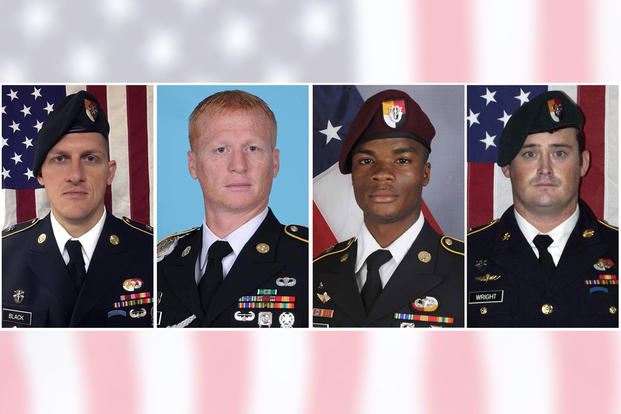A classified Pentagon report attributes the deaths of four U.S. soldiers -- who were ambushed during an operation in Niger in October -- to a list of military shortcomings, including complacency and a lack of training.
In addition, low-level commanders took shortcuts to approve operations -- with at least one officer lifting orders from a different mission and pasting them onto the "so-called concept of operations to gain approval," officials familiar with the report told the Wall Street Journal.
President Donald Trump approved recommendations granting lower-level military commanders the ability make decisions, but the move was not seen as a contributing factor in the Niger deaths, the Journal reported, citing information from the sources.
The report also cited a culture of excessive risk, according to the paper.
Initially, the mission on Oct. 3, 2017, that ultimately sent the Army Special Forces team, along with Nigerien soldiers, into a deadly ambush, was a planned meeting with local officials. However, the team was redirected to assist in a search for Doundou Chefou, a militant suspected of involvement in the kidnapping of an American aid worker.
Upon returning, the team was later attacked by Islamic State-linked militants in a village near Tongo Tongo, resulting in the deaths of four U.S. soldiers and four Nigerien troops on Oct. 4.
The slain U.S. military members were identified as Sgt. La David Johnson, Staff Sgt. Bryan Black, Staff Sgt. Jeremiah Johnson and Staff Sgt. Dustin Wright.
The report also includes measures from Defense Secretary Jim Mattis aimed at preventing a similar incident from happening again, including, "reinforce normal protocols within the chain of command," the sources told the Journal.
The months-long investigation consists of testimony, diagrams, maps and video from the helmet cameras of the soldiers, as well as statements from Mattis, the Joint Chiefs of Staff and from the Africa Command, the paper reported.
Families of the fallen military heroes will be briefed on the 6,000-page report, along with lawmakers, before a declassified version is released to the public in the coming days, the paper reported.




